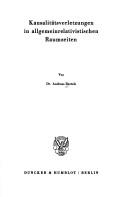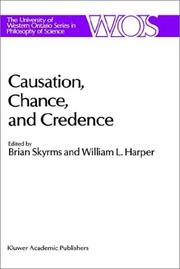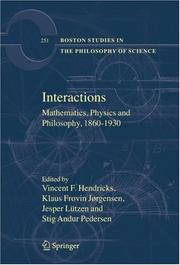| Listing 1 - 5 of 5 |
Sort by
|
Book
ISBN: 0306436086 9780306436086 Year: 1990 Volume: 226 Publisher: New York London Plenum
Abstract | Keywords | Export | Availability | Bookmark
 Loading...
Loading...Choose an application
- Reference Manager
- EndNote
- RefWorks (Direct export to RefWorks)
Book
ISBN: 2040097945 9782040097943 Year: 1974 Volume: 624 Publisher: Paris : Dunod,
Abstract | Keywords | Export | Availability | Bookmark
 Loading...
Loading...Choose an application
- Reference Manager
- EndNote
- RefWorks (Direct export to RefWorks)
Quantum theory. --- 530.145 --- Quantum dynamics --- Quantum mechanics --- Quantum physics --- Physics --- Mechanics --- Thermodynamics --- Quantum theory --- 530.145 Quantum theory --- 53 (075.8) --- Laguerre polynomials --- Dirac's theory --- Operators(Self Adjoint-) --- Schroedinger equation --- Uncertainty principle

ISBN: 3428060164 Year: 1986 Volume: 68 Publisher: Berlin : Duncker & Humblot,
Abstract | Keywords | Export | Availability | Bookmark
 Loading...
Loading...Choose an application
- Reference Manager
- EndNote
- RefWorks (Direct export to RefWorks)
Space and time --- Causality (Physics) --- General relativity (Physics) --- Relativistic theory of gravitation --- Relativity theory, General --- Gravitation --- Physics --- Relativity (Physics) --- Causality --- Heisenberg uncertainty principle --- Nuclear physics --- Quantum theory --- Space of more than three dimensions --- Space-time --- Space-time continuum --- Space-times --- Spacetime --- Time and space --- Fourth dimension --- Infinite --- Metaphysics --- Philosophy --- Space sciences --- Time --- Beginning --- Hyperspace --- Space and time.

ISBN: 9027726337 9401077886 9400928637 Year: 1988 Volume: vol 41 1 Publisher: Dordrecht Boston London Kluwer
Abstract | Keywords | Export | Availability | Bookmark
 Loading...
Loading...Choose an application
- Reference Manager
- EndNote
- RefWorks (Direct export to RefWorks)
Causality (Physics) --- -Probabilities --- -Science --- -Natural science --- Science of science --- Sciences --- Probability --- Statistical inference --- Combinations --- Mathematics --- Chance --- Least squares --- Mathematical statistics --- Risk --- Causality --- Heisenberg uncertainty principle --- Nuclear physics --- Physics --- Quantum theory --- Congresses --- Philosophy --- -Congresses --- Probabilities --- Science --- Natural science --- Philosophy&delete& --- Natural sciences

ISSN: 00680346 ISBN: 9781402051951 1402051948 9781402051944 1402051956 128074507X 9786610745074 904817306X Year: 2006 Volume: 251 Publisher: Dordrecht Springer
Abstract | Keywords | Export | Availability | Bookmark
 Loading...
Loading...Choose an application
- Reference Manager
- EndNote
- RefWorks (Direct export to RefWorks)
This is an outstanding collection of original essays. All of them concern the history and philosophy of mathematics and physics in the years from 1870 to 1930. More specifically, they are intellectual histories of the interactions between the three disciplines, philosophy, mathematics and physics, in that period. And as the essays bring out, what a period it was: of both ferment and synergy, heat and light! Most of the giants - especially Helmholtz, Hertz, Poincare, Hilbert, Einstein and Weyl - are here: engaging not just in physics and mathematics but also in philosophy, often together, or with figures like Schlick. The editors are to be congratulated on a major contribution to our understanding of one of the most complex but fertile periods in the history of all three disciplines. - Jeremy Butterfield, University of Cambridge This stimulating volume covers a wide range of topics which are of direct interest to anyone who thinks about the curious relation between mathematics and the natural world. Philosophers often pose interesting questions about the "dispensability" of mathematics to science. But they too often overlook the wealth of philosophical perplexities that can arise in detailed examples and case studies, both contemporary and historical. This volume refocuses our attention by addressing a number of topics connected to applied mathematics, any one of which is worthy of every philosopher’s attention. - James Robert Brown, University of Toronto What to make of neo-Kantianism in its hey-day, from 1840-1940? It was the most prolific of times and the most seminal, it was the most muddled and confused, it is philosophy working at its hardest with science and most damagingly against science. It is examined here episodically, as it engaged individual scientists: Helmholtz, , Hertz, Poincare, Minkowski, Hilbert, Eddington and Weyl. If Einstein is not in their number, he had to contend with their influence, and anyway he transformed their agenda. The essays on these figures are glinting in their focus and scholarship. Whatever one thinks of neo-Kantianism, this book is history and philosophy of science at its best: mathematically and physically informed, historically engaged, and philosophically driven. - Simon Saunders, University of Oxford Ten first-rate philosopher-historians probe insightfully into key conceptual questions of pre-quantum mathematical physics, from Helmholtz and Boltzmann, through Hertz and Lorentz, to Einstein, Weyl and Eddington, with an interesting aside on the rarely studied philosophy of Federigo Enriques. A rich and effective display of what the critical history of science can do for our understanding of scientific thought and its achievements. Roberto Torretti, University of Puerto Rico.
History of philosophy --- Pure sciences. Natural sciences (general) --- Theory of knowledge --- History of physics --- filosofie --- epistomologie --- Mathematics --- geschiedenis --- Philosophy of science --- wetenschapsgeschiedenis --- wiskunde --- epistemologists --- fysica --- Philosophy. --- History. --- Philosophy and science. --- Mathematics. --- Physics. --- Philosophy, general. --- History of Mathematical Sciences. --- History of Science. --- Philosophy of Science. --- History and Philosophical Foundations of Physics. --- History of Philosophy. --- Science and philosophy --- Science --- Natural philosophy --- Philosophy, Natural --- Physical sciences --- Dynamics --- Math --- Annals --- Auxiliary sciences of history --- Mental philosophy --- Humanities --- Mathematical analysis --- Physics --- Causality (Physics) --- Foundations. --- 517.1 --- Philosophy and science --- Normal science --- Logic of mathematics --- Mathematics, Logic of --- Causality --- Heisenberg uncertainty principle --- Nuclear physics --- Quantum theory --- 517.1 Mathematical analysis --- Philosophy --- Causality (Physics). --- Philosophy (General). --- Foundations
| Listing 1 - 5 of 5 |
Sort by
|

 Search
Search Feedback
Feedback About UniCat
About UniCat  Help
Help News
News